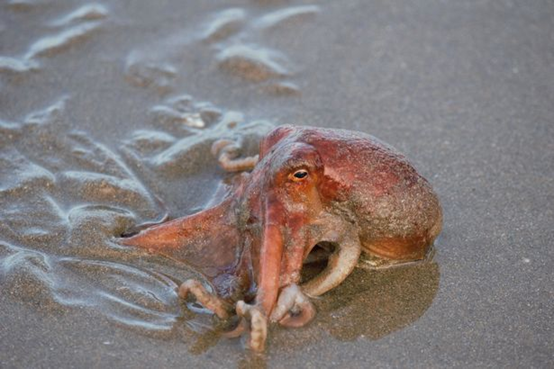A stormy situation
Imagine you’re taking a walk along the beach looking out to sea when all of a sudden you see an octopus crawling across the sand. Wouldn’t that be an unusual sight? Well this is exactly what wildlife guides Josh Pedley and Fran Fitzpatrick saw back on the 21st February 2022 at 4:45pm on Traeth Gwyn in New Quay. The two octopuses were seen making their way back to sea after being washed up following storms Eunice and Franklin, and according to the wildlife guides who work for SeaMor Dolphin Watching Boat trips, were in healthy condition. It was an extremely rare sighting as this particular species, the Curled octopus (Elodone cirrhosa), are not usually seen on the shore1.
This wasn’t the first time octopus have been found on Welsh shores. In October 2017, over 20 were spotted making their way out of the water following storms such as hurricane Ophelia and storm Brian. It’s not unusual for some species of octopus for example the algae octopus (Abdopus aculeatus) to leave the sea when the tide is out and move between rockpools in search of food like fish and crustaceans. However, according to Mandy Reid, Australian cephalopod expert, it is unusual for a whole lot of them to be crawling onto the beach 2,3. What was also peculiar was that some individuals were found dead on the same beach over the next few nights. Octopuses are nocturnal and therefore it is likely that many more must have emerged from the sea overnight. The cause of death for these animals is still unknown and will not be able to be confirmed without physical examination4.
Behaviour
Why these animals were displaying this strange behaviour is also unknown however it is thought that one possible reason could be changes in the environment 2,4. Reid suggests that the storms might be causing the animals to become disorientated and move towards the shore. Cephalopods are highly sensitive to environmental conditions and have been shown to exhibit behavioural flexibility, which is the ability innovatively to modify behaviour to respond effectively to novel situations 5. This behavioural flexibility may explain the changes in behaviour of cephalopods to move towards the shore in rough weather conditions. Studies show that other factors likely to explain this flexibility are increased predation, intense mating competition and increased foraging challenges6.
James Wood, owner of the Coral Sea Aquarium and editor of the site Cephalopod page speculates that these octopuses could be undergoing senescence and that this might explain the change in behaviour. Senescence is the term for the end stages of an octopus’s life when it starts to feed less, exhibit less coordination, and move around without much direction. Behavioural changes have been observed following changes in the cephalopod life cycle including increased activity in senescent male octopuses and a higher likelihood of attempts to escape from enclosures 4,7,8. Octopuses will usually live for a year and die after they lay their eggs. Graham Pierce from the U.K’s Marine Biological Association stated that curled octopuses in Wales lay their eggs and begin to die around October which coincides with the time of year the octopus were seen moving out of the sea in 2017. Hofmeister suggests that although senescence is a possibility, it is most likely that they were looking for shelter due to their energetic movements upon returning to the sea filmed by Stones. However this cannot be confirmed as so far there have been no examinations to determine whether or not female octopus were carrying eggs or had recently laid them4.
Octopuses and overcrowding
Jenny Hofmeister, a postdoctoral scholar at the Scripps Institution of Oceanography in San Diego has another idea on why these octopus are leaving the sea. She suggests that the movements towards land may have been caused by overcrowding from booming populations. It’s been speculated that an increase in the depletion of large animals that feed on octopuses by fisherman have resulted in a boom in octopus population and consequently individuals are having to travel further to find food and shelter4,9.
Although these sightings are very rare, it’s important to stress that if you are to come across an octopus crawling across the sand you must be very careful not to touch or disturb them as they are wild animals.
Cerys Hartland Research Intern
References
Harrison, R., 2022. Octopus filmed ‘walking’ its way back to sea on Welsh beach. [online] WalesOnline. Available at: <https://www.walesonline.co.uk/news/wales-news/octopus-beach-shore-new-quay-23194251> [Accessed 8 May 2022].
Starr, M., 2022. A Team of Octopuses Has Been Caught Crawling Out of The Sea in Wales. [online] ScienceAlert. Available at:
The Kids Should See This. 2016. The Abdopus Octopus walks across dry land to hunt for crabs. [online] Available at: <https://thekidshouldseethis.com/post/the-abdopus-octopus-walks-across-dry-land-to-hunt-for-crabs> [Accessed 8 May 2022].
Gibbens, S., 2017. Why Dozens of Octopuses Marched Out of the Sea. [online] Available at: <https://www.nationalgeographic.com/animals/article/wales-ceredigion-octopus-land-deaths-spd> [Accessed 8 May 2022].
Semmens, J., Pecl, G., Gillanders, B., Waluda, C., Shea, E., Jouffre, D., Ichii, T., Zumholz, K., Katugin, O., Leporati, S. and Shaw, P., 2007. Approaches to resolving cephalopod movement and migration patterns. Reviews in Fish Biology and Fisheries, 17(2-3), pp.401-423.
Schnell, A., Amodio, P., Boeckle, M. and Clayton, N., 2020. How intelligent is a cephalopod? Lessons from comparative cognition. Biological Reviews, 96(1), pp.162-178.
Anderson, R., Wood, J. and Byrne, R., 2002. Octopus Senescence: The Beginning of the End. Journal of Applied Animal Welfare Science, 5(4), pp.275-283.
Robin, J.,Roberts, M., Zeidberg, L. et al. 2014. Chapter Four – Transitions During Cephalopod Life History: The Role of Habitat, Environment, Functional Morphology and Behaviour. Advances in Marine Biology, 67, pp. 361-437.
Arkhipkin, A., 2016. Octopus and squid populations are booming – here’s why. [online] The Conversation. Available at: <https://theconversation.com/octopus-and-squid-populations-are-booming-heres-why-59830> [Accessed 8 May 2022].

























